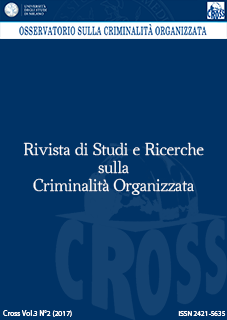Organized crime in Cetral-East Europe after 1989. A geopolitical prospective
DOI:
https://doi.org/10.13130/cross-8889Abstract
The paper concerns the geopolitical background of the emergence and functioning of organized crime in Central-East Europe. The author outlines the main characteristics of the geopolitical situation of the region after the transformation. A special focus is given to the rise, structure and operational manners of organized crime at the new, eastern border of EU. Eventually the author considers the relations between organized crime and new terrorism, acknowledging both these phenomena as a threat towards social, political and economic stability in the Central-East Europe. Likewise to several Polish scholars and experts, the author recognizes the patterns of the highly dangerous process of organized crime's evolution into terrorism. The author emphasizes that authorities of the European states must take into account both dangers as deeply relevant issue for security of their countries and citizens.
Keywords: Geopolitics; Central-East Europe, European Union, Organized Crime, Terrorism






